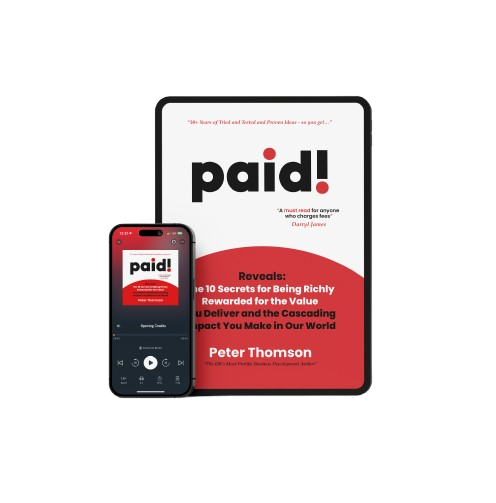
Why Undercharging is Costing You More Than Money
Sep 03, 2025The Hidden Cost of Playing Small
Imagine this:
You’re sitting across from a client who just paid half your usual rate — because you didn’t ask for more.
They’re demanding more than they paid for.
You’re holding your tongue.
You’re over-delivering (again).
And yet — you resent it.
This isn’t just about fees.
It’s about energy leaks, resentment, and quietly eroding self-worth.
Undercharging doesn’t just dent your bank account. It dents your identity.
Why You’re Not Charging What You’re Worth
Let’s be honest. If you’re reading this, you’re probably already damn good at what you do.
Clients rave. Referrals trickle in.
But still — your pricing doesn’t reflect your true value.
Here’s why that happens:
The Cycle of Self-Doubt
- “If I raise my prices, I’ll lose clients.”
- “I’m not quite ready to charge more.”
- “People in my industry don’t pay that.”
That’s not strategy. That’s fear talking.

Attribution Error (as Peter Thomson calls it)
You assume:
- “If I price lower, more people will say yes.”
- “If they don’t buy, it’s because I’m too expensive.”
Wrong.
In most cases, people don’t buy because you’re not expensive enough to be taken seriously.
Pricing low puts you in the same mental category as cheap, generic, replaceable.
And you’re not.
The Price You Pay (Beyond the Fee)
Undercharging takes a toll far deeper than income.
- Lower-Quality Clients
People who pay less, value less.
They question more.
They show up late.
They drain your time.
- Overworking to Compensate
You say yes to more clients — just to hit your income goal.
You burn out trying to fill the revenue gap.
- Erosion of Identity
Every time you discount, defer or dance around your price…
You reinforce the belief: “Maybe I’m not worth more.”
And that gets expensive — emotionally, mentally, energetically.
The Identity Shift That Changes Everything
Here's the real kicker:
“You don’t get paid what you’re worth.
You get paid what you believe you’re worth – and what you ask for.”
This isn’t about greed. It’s about alignment.
When you charge appropriately:
- You respect your time.
- You attract clients who respect you.
- You show up with more energy, confidence and creativity.
And your clients?
They get better results — because they’ve invested in the outcome, not just the service.

How to Raise Your Fees With Integrity
No sleaze. No salesy tactics.
Just simple, clean positioning that earns trust and gets you paid.
Step 1: Repackage Your Value
Don’t sell time. Sell outcomes.
Instead of “3 coaching calls”, sell “3X productivity in 30 days”.
Clients pay for the result, not the format.
Step 2: Anchor Your Pricing in Value
Ask these:
- What’s the cost of not solving this problem?
- What’s the ROI of a successful result?
- What are they likely to spend if they go elsewhere?
Then price accordingly.
Step 3: Use Confident, Calm Language
Avoid:
- “My usual rate is…”
- “I normally charge…”
- “I hope that’s okay…”
Try:
- “This programme is £X and includes Y.”
- “Based on what we’ve discussed, here’s what I recommend.”
- Silence.
Confidence isn’t loud.
It’s clean, neutral and grounded.
Step 4: Create Options — Not Discounts
Let clients choose, not haggle.
Example:
- Option A: £2,500 for done-for-you
- Option B: £1,500 for guided support
- Option C: £750 for self-paced
Same value. Different formats. Clear boundaries.
Step 5: Practice “Fee Familiarity”
Say your new price aloud 10x a day.
Pitch it in the mirror.
Write it in mock emails.
Let it become emotionally neutral before you say it to a real client.
How You Might Use This in Your Business
Here’s a quick audit to run this week:
|
Question |
Yes / No |
|
Are my current prices based on time, not transformation? |
|
|
Do I feel resentful after delivering work? |
|
|
Have I had a client recently who undervalued my input? |
|
|
Do I know I could raise my prices… but haven’t? |
If you answered “yes” to two or more — your pricing needs attention.
And here's what to do next:
The Undercharging Exit Plan:
- Reframe what you sell as outcomes, not inputs
- Identify the clients who already value your work
- Set a new base price that reflects your confidence
- Practise delivering it — without explanation
- Point future prospects to a clear, premium offer page
Final Thoughts & Next Step
If you want premium clients, fulfilling work and income that reflects your true impact — it starts with one bold move:
👉 Raise. Your. Prices.
Not wildly. Not randomly.
But strategically — with belief behind every pound.
Because you’re not here to be “affordable”.
You’re here to be valuable.
Want the Framework that Makes This Effortless?
Peter Thomson’s book, PAID!, goes deeper into pricing models, packaging, positioning and building a life of your choosing.
Go to 👉 www.thepaidbook.com

It’s a must-read if you’re serious about being richly rewarded for the value you deliver.
Stay connected with bite-size videos and updates!
Gain an unfair advantage and join fellow achievers who receive tgiMondays - FREE weekly bite-sized videos and blogs on business and personal growth and inspiration from my latest off the edge thinking and ideas.
We hate SPAM. We will never sell your information, for any reason.

